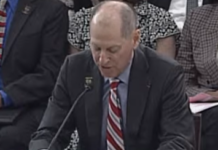CBS KFVS-TV Cape Girardeau MO has struck a blow for local radio stations that are threatened with at best difficult real world choices, or at worst, financial ruin, if the Performance Rights Act makes it into law.
KFVS spoke with Ron Ellis of Country WIBH-AM, licensed to Anna IL, who said the $5K annual fee he’d be liable for was enough to put his ability to pay the bills into question. He said if PRA passes, he’s looking at a Talk format or getting out of the business.
Scott Richards of River Radio told KFVS that he’d have stations liable for the top rate. He noted that the cash for that would be coming on top of anticipated increase in composer royalty payments. Other broadcasters in the area, he said, have already made staff cuts, and said if PRA is enacted that is probably what he would have to do as well.
KFVS’s Mike Smythe, in a station editorial, described the age-old free promotion for free music deal between musicians, recording companies and radio stations, noting that it made many, many musicians very rich. He noted that the recording companies are reeling from losses that can be traced to the internet, and said that by trying to replace lost revenue via PRA, it is biting the hand that feeds them.
He concluded, “The greedy record companies want to take up to 7% of the stations’ revenues and send it to the owners who are mostly overseas. The owners of these record companies are in Paris, London, Tokyo, and Hollywood. Local, free, over-the-air radio is critical to every city. This lost money, including those stations right here in the Heartland, will directly cut important local radio services.”
RBR-TVBR observation: KFVS asked a few questions, to a small radio group and an even smaller standalone radio station, and found out what the real impact of PRA would be.
Meanwhile, Sen. Patrick Leahy (D-VT) and Rep. John Conyers (D-MI) pretend to be standing up for struggling musicians even while they prepare to funnel cash instead to giant recording companies in what amounts to a corporate welfare program.
The level of success that subjects a station to the full brunt of the burden is only $1.25M annual gross revenue. Is that the new definition of a license to print money? A station that is conscientiously attempting to foot the bill to field a local staff and superserve its local market is going to be hard pressed to do so with that amount of cash coming in.
However, the affordability of PRA – or lack thereof – should not even be part of the debate. The simple fact is that the decades-long symbiotic relationship between radio and recording companies has served both well. The fact that the recording companies failed to respond to the threat posed to them by the internet is not radio’s fault, and does not change the dynamic between the two industries. The end result of the recording companies’ failures should not be the punishment of radio via PRA.




